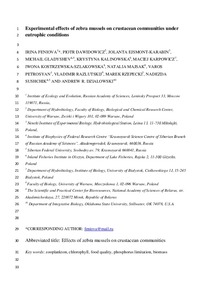Effects of zebra mussels on cladoceran communities under eutrophic conditions
Скачать файл:
URI (для ссылок/цитирований):
http://www.readcube.com/articles/10.1007/s10750-018-3699-4https://elib.sfu-kras.ru/handle/2311/110756
Автор:
Feniova, I.
Dawidowicz, P.
Ejsmont-Karabin, J.
Gladyshev, M.
Kalinowska, K.
Karpowicz, M.
Kostrzewska-Szlakowska, I.
Majsak, N.
Petrosyan, V.
Razlutskij, V.
Rzepecki, M.
Sushchik, N.
Dzialowski, A. R.
Коллективный автор:
Институт фундаментальной биологии и биотехнологии
Кафедра водных и наземных экосистем
Дата:
2018-10Журнал:
HydrobiologiaКвартиль журнала в Scopus:
Q1Квартиль журнала в Web of Science:
Q2Библиографическое описание:
Feniova, I. Effects of zebra mussels on cladoceran communities under eutrophic conditions [Текст] / I. Feniova, P. Dawidowicz, J. Ejsmont-Karabin, M. Gladyshev, K. Kalinowska, M. Karpowicz, I. Kostrzewska-Szlakowska, N. Majsak, V. Petrosyan, V. Razlutskij, M. Rzepecki, N. Sushchik, A. R. Dzialowski // Hydrobiologia. — 2018. — Т. 822.Аннотация:
The purpose of this study was to determine how zebra mussels affected cladoceran community structure under eutrophic conditions. We conducted a mesocosm study where we manipulated the presence of zebra mussels and the presence of large-bodied Daphnia (Daphnia magna and Daphnia pulicaria). We also conducted a complimentary life-table experiment to determine how water from the zebra mussel treatment affected the life history characteristics of the cladoceran species. We anticipated that small- and large-bodied cladoceran species would respond differently to changes in algal quality and quantity under the effects of zebra mussels. Large-bodied Daphnia successfully established in the zebra mussel treatment but failed to grow in the control. We did not observe positive relationships between food concentrations and cladoceran abundances. However, the phosphorus content in the seston indicated that food quality was below the threshold level for large-bodied cladocerans at the beginning of the experiment. We believe that zebra mussels quickly enhanced the phosphorus content in the seston due to the excretion of inorganic phosphorus, thus facilitating the development of large-bodied Daphnia. In conclusion, our results suggest that zebra mussels can alter the phosphorus content of seston in lakes and this can affect the dynamics of crustacean zooplankton.

